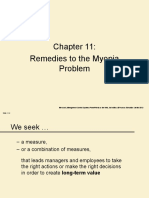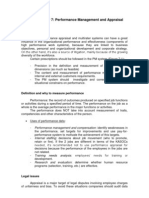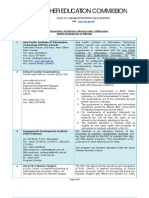Chapter 12
Chapter 12
Uploaded by
Yuxuan SongCopyright:
Available Formats
Chapter 12
Chapter 12
Uploaded by
Yuxuan SongOriginal Description:
Copyright
Available Formats
Share this document
Did you find this document useful?
Is this content inappropriate?
Copyright:
Available Formats
Chapter 12
Chapter 12
Uploaded by
Yuxuan SongCopyright:
Available Formats
Slide 12.
Chapter 12:
Using Financial Results Controls in
the Presence of Uncontrollable
Factors
Merchant, Management Control Systems PowerPoints on the Web, 3rd edition, Pearson Education Limited 2012
Slide 12.2
Controllability principle
Employees should be held accountable only for that
which they alone can control; or,
Employees should be held accountable only for that
over which they have significant influence?
Merchant, Management Control Systems PowerPoints on the Web, 3rd edition, Pearson Education Limited 2012
Slide 12.3
Rationale
Uncontrollable factors distort performance measures
and evaluations
Uncontrollable risks are best borne by shareholders
(who are better able to diversify them)
If managers bear the risk:
They must be compensated for it
They may engage in undesirable actions to protect
themselves from the risks
For example, by engaging in gameplaying behaviors
Merchant, Management Control Systems PowerPoints on the Web, 3rd edition, Pearson Education Limited 2012
Slide 12.4
Considerations
Purpose(s) for which adjustments for
uncontrollables are made?
Salary raises
Incentive pay (short-term, long-term)
Job retention
Merchant, Management Control Systems PowerPoints on the Web, 3rd edition, Pearson Education Limited 2012
Slide 12.5
Considerations (continued)
Types of uncontrollables for which adjustments
are made?
Acts of nature (force majeure)
Economic, competitive factors
Interdependencies
Uncontrollables due to decisions made by personnel in
other parts of the organization, such as at higher levels
or in other entities
Merchant, Management Control Systems PowerPoints on the Web, 3rd edition, Pearson Education Limited 2012
Slide 12.6
Considerations (continued)
Who makes the adjustments?
Immediate superior
Upper management
(Compensation committee of the) Board of Directors
Done automatically by predetermined formulae/rules
Merchant, Management Control Systems PowerPoints on the Web, 3rd edition, Pearson Education Limited 2012
Slide 12.7
Considerations (continued)
Which method to use to make the adjustments?
Variance analysis
Flexible performance targets (e.g., flexed budgets)
Relative performance evaluations (RPE)
Subjective judgments
Merchant, Management Control Systems PowerPoints on the Web, 3rd edition, Pearson Education Limited 2012
Slide 12.8
Other choices
Should the adjustments be total or partial?
Should the adjustments be for negative
uncontrollable factors only (i.e., bad luck),
or should adjustments be made in either direction,
both positive and negative?
Merchant, Management Control Systems PowerPoints on the Web, 3rd edition, Pearson Education Limited 2012
Slide 12.9
How to decide?
Costs vs. benefits
For some types of adjustments, the benefits clearly
outweigh the costs
Factor is totally uncontrollable
Manager is not expected to respond to the factor
The effect of the uncontrollable factor can be
calculated objectively
Merchant, Management Control Systems PowerPoints on the Web, 3rd edition, Pearson Education Limited 2012
Slide 12.10
How to decide? (continued)
Benefits of making adjustments
More accurate performance evaluations
Less manager frustration; better motivation
Better decision-making; less noise in the
performance measures
Lower compensation costs
(in the long run less risk, less turnover)
Merchant, Management Control Systems PowerPoints on the Web, 3rd edition, Pearson Education Limited 2012
Slide 12.11
How to decide? (continued)
What if the company wants the managers to
respond to an uncontrollable factor?
Should not buffer them completely from the effects
Consider partial adjustment
Merchant, Management Control Systems PowerPoints on the Web, 3rd edition, Pearson Education Limited 2012
Slide 12.12
How to decide? (continued)
What if the effect of the uncontrollable
factor can only be estimated?
Enter subjectivity
Subjectivity introduces another form of risk
evaluation bias
Merchant, Management Control Systems PowerPoints on the Web, 3rd edition, Pearson Education Limited 2012
Slide 12.13
How to decide? (continued)
What if the factor is only partially uncontrollable?
Consider not making adjustments
Performance measures provide some information
about managers performance
Consideration of adjustments leads to the creation
of an excuse culture
Managers are prone to make excuses instead of
addressing the problems
Costly in terms of management time involved to
investigate the claims and determine appropriate
adjustments
Merchant, Management Control Systems PowerPoints on the Web, 3rd edition, Pearson Education Limited 2012
Slide 12.14
How to decide? (continued)
If adjustments are made, where they should
not be made
Bad decisions; managers fail to consider
relevant factors in their decision making
Shareholders lose as managers are given
undeserved rewards
Merchant, Management Control Systems PowerPoints on the Web, 3rd edition, Pearson Education Limited 2012
Slide 12.15
Summary
Consider costs and benefits of making
adjustments
Benefits exceed costs if:
Factor is clearly uncontrollable and if the firm
does not want managers to respond (they have
no influence)
Subjectivity can be avoided (or is tolerated)
In all other cases, use adjustments sparingly
Merchant, Management Control Systems PowerPoints on the Web, 3rd edition, Pearson Education Limited 2012
You might also like
- Factors That Influence Grade 11 Students in Choosing ABM CourseDocument39 pagesFactors That Influence Grade 11 Students in Choosing ABM Courseangelyn marcon83% (35)
- Merchant, Van Der Stede Slides h05Document7 pagesMerchant, Van Der Stede Slides h05Fitria Nur HidayahNo ratings yet
- Introduction To Quantitative Analysis Q Y: Learning ObjectivesDocument3 pagesIntroduction To Quantitative Analysis Q Y: Learning ObjectivesT S Akmal RidzuanNo ratings yet
- Performance Appraisal Problems and SolutionsDocument6 pagesPerformance Appraisal Problems and SolutionsAnna Hudson50% (2)
- NCM 103Document18 pagesNCM 103Anonymous iG0DCOf100% (1)
- DLL Perdev 2nd WeekDocument4 pagesDLL Perdev 2nd WeekFelyn DelaCruz - Dalino100% (5)
- Chapter 9Document18 pagesChapter 9Ibrahim Genc100% (1)
- Chapter 11Document22 pagesChapter 11Yuxuan SongNo ratings yet
- Chapter 14Document19 pagesChapter 14Yuxuan Song100% (1)
- Chapter 08Document17 pagesChapter 08Yuxuan SongNo ratings yet
- F 09420010120134024 PP T 11Document17 pagesF 09420010120134024 PP T 11Stevia TjioeNo ratings yet
- Chapter 13Document16 pagesChapter 13Yuxuan SongNo ratings yet
- Chapter 10Document19 pagesChapter 10Yuxuan SongNo ratings yet
- CH13-Using Financial Results Controls in The Presence of Uncontrollable FactorsDocument11 pagesCH13-Using Financial Results Controls in The Presence of Uncontrollable FactorsTantri ErviantiNo ratings yet
- Atkinson6e PPT Ch01 REVISEDDocument14 pagesAtkinson6e PPT Ch01 REVISEDnusaibaNo ratings yet
- Chapter 14Document29 pagesChapter 14Rashid Al-MansouriNo ratings yet
- Chap 012Document28 pagesChap 012Anthony MaloneNo ratings yet
- A Managers Guide To Managing UnderperformanceDocument11 pagesA Managers Guide To Managing UnderperformanceSteve TowsonNo ratings yet
- Chap 012Document26 pagesChap 012Nazifa AfrozeNo ratings yet
- Horngren MGMT Ch13Document23 pagesHorngren MGMT Ch13AndyMaviaNo ratings yet
- SDLCDocument93 pagesSDLCAnnie Yeo100% (1)
- Compensation StructureDocument57 pagesCompensation Structurevitthal2020No ratings yet
- Positive Accounting TheoryDocument47 pagesPositive Accounting TheoryAshraf Uz ZamanNo ratings yet
- How Management Accounting Information Supports Decision MakingDocument16 pagesHow Management Accounting Information Supports Decision MakingmajdalmarshoudNo ratings yet
- Compensation StructureDocument57 pagesCompensation Structurehr_nishNo ratings yet
- Action, Personnel, and Cultural ControlsDocument15 pagesAction, Personnel, and Cultural Controlsevaluv100% (1)
- Management Control System CH 1Document18 pagesManagement Control System CH 1atma50% (2)
- F13a Merchant Om Finansiella Mått, CH 10Document21 pagesF13a Merchant Om Finansiella Mått, CH 10Ilias AmraniNo ratings yet
- Methods of Performance AppraisalDocument46 pagesMethods of Performance AppraisalPooja Ujjwal Jain100% (2)
- 01 - Technical Articles ListDocument8 pages01 - Technical Articles ListayushNo ratings yet
- PDF Solution Manual For Performance Management, 3/E 3rd Edition: 0132556383 DownloadDocument63 pagesPDF Solution Manual For Performance Management, 3/E 3rd Edition: 0132556383 Downloadeyfeldbodmas100% (1)
- HRM - Chapter 7: Performance Management and AppraisalDocument5 pagesHRM - Chapter 7: Performance Management and AppraisalAli SameiNo ratings yet
- Problems in Performance AppraisalDocument7 pagesProblems in Performance AppraisalKyle annieNo ratings yet
- ch12 Evaluation ControlDocument13 pagesch12 Evaluation ControlYoussef Youssef Ahmed Abdelmeguid Abdel LatifNo ratings yet
- Chap 7. Implementing A Performance Management System - PPTX 1Document61 pagesChap 7. Implementing A Performance Management System - PPTX 1jlouestadoNo ratings yet
- Minimizing Bias in Performance AppraisalDocument5 pagesMinimizing Bias in Performance AppraisalLuo JeffNo ratings yet
- Management Control Systems: Chapter 2: Results ControlsDocument9 pagesManagement Control Systems: Chapter 2: Results ControlsFlorentina FebriyaniNo ratings yet
- Topic 3 The Internal Structure of The CompanyDocument71 pagesTopic 3 The Internal Structure of The CompanyMahou TiNo ratings yet
- Dysfunctional Performance MeasurementDocument7 pagesDysfunctional Performance Measurement321daiqiNo ratings yet
- Management Control Systems: Chapter 2: Results ControlsDocument9 pagesManagement Control Systems: Chapter 2: Results Controlsnurul ilmaNo ratings yet
- How Management Accounting Information Supports Decision MakingDocument36 pagesHow Management Accounting Information Supports Decision MakingZbRZivPQ51pEZ9PUNo ratings yet
- Compensation BenefitsDocument57 pagesCompensation BenefitsharshadaxyzNo ratings yet
- Full Download of Managing Human Resources 7th Edition Gomez-Mejia Solutions Manual in PDF DOCX FormatDocument51 pagesFull Download of Managing Human Resources 7th Edition Gomez-Mejia Solutions Manual in PDF DOCX FormattebkewilnieNo ratings yet
- Accounting For Managerial Decision (6th Sem Notes)Document36 pagesAccounting For Managerial Decision (6th Sem Notes)Kamal Sachdev67% (3)
- Guswin Manajemen Hal 494-496Document3 pagesGuswin Manajemen Hal 494-49632MJI Made Angga Dwipaguna MudithaNo ratings yet
- Wheelen - Chapter 12 - Execution - ControlDocument39 pagesWheelen - Chapter 12 - Execution - ControlpoisonboxNo ratings yet
- OSX ManagerialAccounting Ch12 PPTDocument40 pagesOSX ManagerialAccounting Ch12 PPTDiệp ThanhNo ratings yet
- 4.performance Management SystemDocument28 pages4.performance Management SystemRosemin VirjiNo ratings yet
- Performance Managment System Chapter 11Document12 pagesPerformance Managment System Chapter 11misbah ahmedNo ratings yet
- Mapre 7 - ReviewerDocument12 pagesMapre 7 - ReviewerAira Joy GozaNo ratings yet
- Hay Group Guide Chart - Profile Method of Job EvaluationDocument27 pagesHay Group Guide Chart - Profile Method of Job EvaluationImpulsive collector80% (10)
- MOB ControllingDocument8 pagesMOB Controllingrafinfaisal039No ratings yet
- Not For Profit Making OrganisationDocument17 pagesNot For Profit Making OrganisationtshepomoejanejrNo ratings yet
- Corporate Governance and Managerial Compensation: Presented by Anum and KomalDocument26 pagesCorporate Governance and Managerial Compensation: Presented by Anum and KomalShazray ZahidNo ratings yet
- CH 10Document28 pagesCH 10Shahid MashhoodNo ratings yet
- Chapter 11 Atkinson Kaplan 2012Document28 pagesChapter 11 Atkinson Kaplan 2012EmmelinaErnestine100% (3)
- Linking IT To Business Metrics: 3-1 © 2009 Pearson Education, Inc. Publishing As Prentice HallDocument22 pagesLinking IT To Business Metrics: 3-1 © 2009 Pearson Education, Inc. Publishing As Prentice HallShubair AliNo ratings yet
- Fundamentals of Performance Improvement: Optimizing Results through People, Process, and OrganizationsFrom EverandFundamentals of Performance Improvement: Optimizing Results through People, Process, and OrganizationsNo ratings yet
- How to Use PDCA Cycle of Improvement to Develop Lean Leaders: Toyota Production System ConceptsFrom EverandHow to Use PDCA Cycle of Improvement to Develop Lean Leaders: Toyota Production System ConceptsRating: 5 out of 5 stars5/5 (3)
- The Customer Success Professional's Handbook: How to Thrive in One of the World's Fastest Growing Careers--While Driving Growth For Your CompanyFrom EverandThe Customer Success Professional's Handbook: How to Thrive in One of the World's Fastest Growing Careers--While Driving Growth For Your CompanyRating: 5 out of 5 stars5/5 (1)
- Chapter 17Document9 pagesChapter 17Yuxuan Song100% (1)
- Chapter 13Document16 pagesChapter 13Yuxuan SongNo ratings yet
- Chapter 10Document19 pagesChapter 10Yuxuan SongNo ratings yet
- Chapter 1Document9 pagesChapter 1Anonymous lp6TeWExPeNo ratings yet
- Action, Personnel, and Cultural ControlsDocument15 pagesAction, Personnel, and Cultural Controlsevaluv100% (1)
- Issues and Concerns About Practice TeachersDocument2 pagesIssues and Concerns About Practice TeachersJannahNo ratings yet
- Internship ReportDocument38 pagesInternship ReportMuhammad Sajid SaeedNo ratings yet
- Lại Thị Minh Huyền CV EnDocument1 pageLại Thị Minh Huyền CV EnHuyen LaiNo ratings yet
- The Civil Engineering SocietyDocument2 pagesThe Civil Engineering SocietyKaito TakahashiNo ratings yet
- D CotDocument43 pagesD CotmikkijainNo ratings yet
- Fabrizi, M.A. - Fantasy Literature. Challenging GenresDocument233 pagesFabrizi, M.A. - Fantasy Literature. Challenging GenresElena NeculaiNo ratings yet
- Online Class House RulesDocument12 pagesOnline Class House RulesIM AM THE ONENo ratings yet
- Bean Bag Hand Ball Lession PlanDocument3 pagesBean Bag Hand Ball Lession Planapi-405560795No ratings yet
- Human Resource ManualDocument56 pagesHuman Resource ManualVincent LiboonNo ratings yet
- Solving The Right Problem (UVA Ilab)Document78 pagesSolving The Right Problem (UVA Ilab)Alex CowanNo ratings yet
- A Thousand Teachers A Thousand MethodsDocument13 pagesA Thousand Teachers A Thousand MethodsMargie Macay LastimosaNo ratings yet
- HW LJa 5 y WD J4 YByakw ZNV 3 BD WCV 4 P 9 K5 Wa NG8 Roc NDocument125 pagesHW LJa 5 y WD J4 YByakw ZNV 3 BD WCV 4 P 9 K5 Wa NG8 Roc Nraselislamr2hNo ratings yet
- Governance in Theory and Practice: Online Course ManualDocument11 pagesGovernance in Theory and Practice: Online Course ManualBilal SindhuNo ratings yet
- Unit I Learning English 1. Why Do We Learn English?Document36 pagesUnit I Learning English 1. Why Do We Learn English?Yuyun padilaNo ratings yet
- Review LeapFrogDocument2 pagesReview LeapFrogDhil HutomoNo ratings yet
- Activities - UNIT - 4 Lesson 11Document6 pagesActivities - UNIT - 4 Lesson 11Raven Ann Trinchera PerezNo ratings yet
- Tarlac State University Vice President For Academic Affairs: Tel. No.: (045) 982-2447 Fax: (045) 982-0110 WebsiteDocument1 pageTarlac State University Vice President For Academic Affairs: Tel. No.: (045) 982-2447 Fax: (045) 982-0110 WebsiteMarianne A. MendozaNo ratings yet
- English Curriculum: Pet BusterDocument10 pagesEnglish Curriculum: Pet BusterXije Mustafai100% (1)
- Transient Analysis of Electric Power Circuits Handbook: Printed BookDocument1 pageTransient Analysis of Electric Power Circuits Handbook: Printed BookmancolmoNo ratings yet
- HEC Approve ACCADocument4 pagesHEC Approve ACCANaina Mukhtar100% (1)
- UNESCO - UIA Charter For Architectural EducationDocument12 pagesUNESCO - UIA Charter For Architectural EducationIrina SanduNo ratings yet
- 12 Eng Biology Lab ManualDocument114 pages12 Eng Biology Lab Manualmohitkumarofkvt87% (45)
- Our ConstitutionDocument72 pagesOur ConstitutionJasbind yadavNo ratings yet
- Annexture - IDocument9 pagesAnnexture - IKaushik BasudebNo ratings yet
- Pisa PDFDocument14 pagesPisa PDFRista WaniNo ratings yet
- Economics Dissertation Proposal FormatDocument5 pagesEconomics Dissertation Proposal FormatHelpWithWritingPapersPittsburgh100% (1)
- Lego Lab Gen 2015Document2 pagesLego Lab Gen 2015api-259776843No ratings yet



























































































